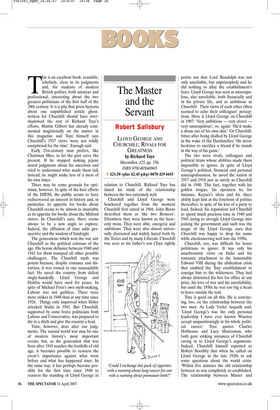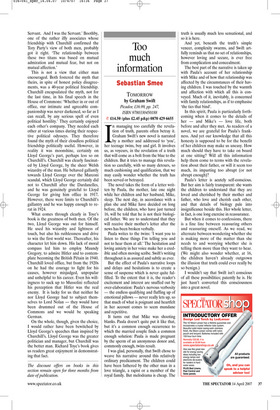The Master and the Servant
Robert Salisbury
LLOYD GEORGE AND CHURCHILL: RIVALS FOR GREATNESS by Richard Toye Macmillan, £25, pp. 356, ISBN 9781405048965 ✆ £21.50 (plus £2.45 p&p) 0870 429 6655 This is an excellent book: readable, scholarly, clear in its judgments and, for students of modern British politics, both amateur and professional, interesting about the two greatest politicians of the first half of the 20th century. It is a pity that press hysteria about one unpublished article ghostwritten for Churchill should have overshadowed the rest of Richard Toye’s efforts. Martin Gilbert has already commented magisterially on the matter in this magazine and Toye himself says Churchill’s 1937 views ‘were not wildly exceptional for the time’. Enough said.
Early 21st-century man prefers, like Chairman Mao, to let the past serve the present. If he stopped making jejune moral judgments about his ancestors and tried to understand what made them tick instead, he might make less of a mess of his own times.
There may be some grounds for optimism, however. In spite of the best efforts of the DfESS, the public seems to have rediscovered an interest in history and, in particular, its appetite for books about Churchill seems to be almost as insatiable as its appetite for books about the Mitford sisters. In Churchill’s case, there seems always to be a new angle to explore. Indeed, the effluxion of time adds perspective and the wisdom of hindsight.
The generations which won the war saw Churchill as the political colossus of the age. His heroic defiance between 1940 and 1942 for them trumped all other possible challengers. The Churchill myth was potent because, despite romance and distortion, it was rooted in one unassailable fact. He saved the country from defeat single-handedly. Lloyd George and Halifax would have sued for peace. In spite of Michael Foot’s own myth-making, Labour was not guiltless. There were more strikes in 1940 than at any time since 1926. Things only improved when Hitler attacked Stalin in 1941. But Churchill, supported by some brave politicians both Labour and Conservative, was prepared to die in a ditch and give the country a lead.
Time, however, does alter our judgments. The second world war may be one of modern history’s most important events, but, as the generation that was born after 1945 reaches the foothills of old age, it becomes possible to reassess the event’s importance against what went before and what has happened since. In the same way, it has perhaps become possible for the first time since 1940 to reassess the standing of Lloyd George in relation to Churchill. Richard Toye has timed his study of the relationship between the two extremely well.
Churchill and Lloyd George were bracketed together from the moment Churchill first ratted in 1904. John Burns described them as ‘the two Romeos’. Elsewhere they were known as the heavenly twins. They were able, energetic and ambitious. They were also almost universally distrusted and widely hated both by the Tories and by many Liberals. Churchill was seen as his father’s son (Toye rightly points out that Lord Randolph was not only unreliable, but unprincipled) and he did nothing to allay the establishment’s fears. Lloyd George was seen as unscrupulous, also unreliable, both financially and in his private life, and as ambitious as Churchill. Their views of each other often seemed to echo their colleagues’ perceptions. Here is Lloyd George on Churchill in 1907: ‘Very ambitious — very clever very unscrupulous’, or, again: ‘He’d make a drum out of his own skin.’ Or Churchill, bitter after being shafted by Lloyd George in the wake of the Dardanelles: ‘He never hesitates to sacrifice a friend if he stands in the way of his game.’ The two were rivals, colleagues and political titans whose abilities made them impossible to ignore. In spite of Lloyd George’s political, financial and personal unscrupulousness, he saved the nation in 1917 and 1918 just as surely as Churchill did in 1940. This fact, together with his golden tongue, his openness to, for instance, Keynes’s ideas and his sheer ability kept him at the forefront of politics thereafter, in spite of his loss of a party to lead. Indeed, his reputation led Churchill to spend much precious time in 1940 and 1941 trying to inveigle Lloyd George into joining the government and such was the magic of the Lloyd George aura that Churchill was happy to drop his name while electioneering well into the 1950s.
Churchill, too, was difficult for lesser politicians to ignore. It was only his anachronistic views on India and his romantic attachment to the lamentable Edward VIII during the abdication crisis that enabled the Tory establishment to consign him to the wilderness. They had always distrusted his lust for office at any price, his love of war and his unreliability, but until the 1930s he was too big a beast to leave outside the tent.
Toye is good on all this. He is convincing, too, on the relationship between the two men. As Lady Violet Asquith said: ‘Lloyd George’s was the only personal leadership I have ever known Winston accept unquestioningly in his whole political career.’ Toye quotes Charles Hobhouse and Lucy Masterman, who both gave striking instances of Churchill caving in to Lloyd George’s arguments. Indeed, Churchill himself reported to Robert Boothby that when he called on Lloyd George in the late 1920s to ask some questions about the world crisis: ‘Within five minutes the old relationship between us was completely re-established. The relationship between Master and Servant. And I was the Servant.’ Boothby, one of the rather iffy associates whose friendship with Churchill confirmed the Tory Party’s view of both men, probably got it right. ‘The relationship between these two titans was based on mutual admiration and mutual fear, but not on mutual affection.’ This is not a view that either man encouraged. Both fostered the myth that theirs, in spite of honest policy disagreements, was a 40-year political friendship. Churchill encapsulated the myth, not for the last time, in his final speech in the House of Commons: ‘Whether in or out of office, our intimate and agreeable companionship was never darkened, so far as I can recall, by any serious spell of even political hostility.’ They certainly enjoyed each other’s company. They needed each other at various times during their respective political odysseys. They therefore found the myth of their cloudless political friendship politically useful. However, in reality it was moonshine, certainly on Lloyd George’s part, perhaps less so on Churchill’s. Churchill was clearly fascinated by Lloyd George, by the sheer Welsh wizardry of the man. He behaved gallantly towards Lloyd George over the Marconi scandal, which Lloyd George certainly did not to Churchill after the Dardanelles, and he was genuinely grateful to Lloyd George for giving him office in 1917. However, there were limits to Churchill’s gallantry and he was happy enough to rerat in 1924.
What comes through clearly in Toye’s book is the greatness of both men. Of the two, Lloyd George was out for himself. He used his wizardry and lightness of touch, but also his ruthlessness and drive to win the first world war. Thereafter, his character let him down. His lack of moral compass led him to employ Maundy Gregory, to admire Hitler and to contemplate becoming the British Pétain in 1940. Churchill loved office, but from the 1920s on he had the courage to fight for his causes, however misjudged, unpopular and unhelpful to his career. Even his willingness to suck up to Mussolini reflected his perception that Hitler was the real enemy. It is lucky for us that neither he nor Lloyd George had to subject themselves to Lord Nolan — they would have been drummed out of the House of Commons and we would be speaking German.
On the whole, though, given the choice, I would rather have been bewitched by Lloyd George’s speeches than inspired by Churchill’s. Lloyd George was the greater politician and manager, but Churchill was the better man. Richard Toye’s book gives us readers great enjoyment in demonstrating that fact.



































































 Previous page
Previous page